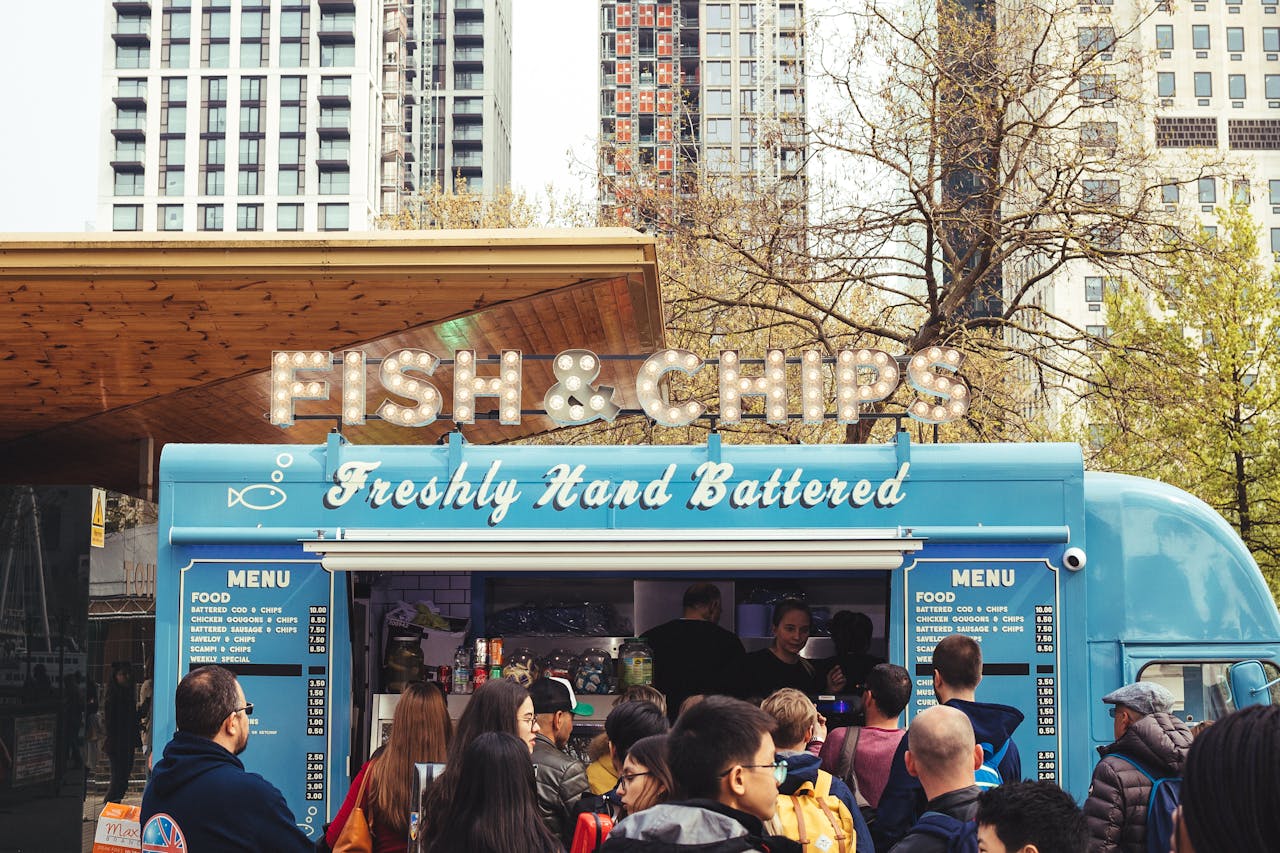
Emerging Trends in the Food Truck Industry
The food truck industry has experienced significant expansion in the last ten years, transforming from a convenient eating choice into a fundamental aspect of contemporary culinary culture. Recognized for their convenience, cost-effectiveness, and variety, food trucks have emerged as a popular option for countless individuals globally. As the sector keeps growing, it is also experiencing considerable changes to address evolving consumer demands and adjust to technological and ecological changes.
The Rise of Gourmet Food Trucks
One of the most noticeable shifts in the food truck industry is the rise of gourmet offerings. Historically, food trucks were associated with quick, simple meals like hot dogs, tacos, and burgers. While these staples remain popular, many food trucks now cater to more refined tastes by offering high-quality, gourmet dishes.
Culinary experts and business owners are utilizing food trucks as a medium to try out high-end, innovative menus that compete with conventional restaurants. This pattern is motivated by customers looking for distinctive and unforgettable dining experiences. Well-known examples consist of lobster rolls, truffle fries, and handcrafted desserts presented in creative manners.
Trucks such as “The Lobster Roll” in New York and “Curry Up Now” in California have gained immense popularity by offering gourmet twists on traditional recipes. These businesses not only satisfy the demand for quality but also prove that food trucks can compete with fine-dining establishments in terms of taste and presentation.

Technological Innovations Driving Growth
Technology is playing a transformative role in enhancing the efficiency and appeal of the food truck industry. From mobile apps to advanced kitchen equipment, technology has become a crucial part of how food trucks operate and connect with customers.
A significant trend in the food truck industry is the adoption of digital point-of-sale systems. These systems enhance operations by facilitating quicker transactions, inventory control, and customer relations management. Furthermore, numerous food trucks are embracing contactless payment options, a change hastened by the COVID-19 pandemic.
Social media platforms are another essential tool for food truck operators. Apps like Instagram, Twitter, and Facebook are used to share menu updates, special promotions, and real-time location information. Location-based apps like Roaming Hunger and Street Food Finder allow customers to track their favorite food trucks and discover new ones.
Moreover, technological innovations are improving the sustainability of food trucks. Solar-powered trucks and energy-efficient equipment are becoming more common, reducing operating costs while appealing to environmentally conscious consumers.
Focus on Health and Wellness
As health-conscious lifestyles become mainstream, food trucks are adapting by offering menus that cater to wellness-focused consumers. The days of greasy, calorie-laden meals dominating the food truck scene are giving way to healthier options that align with dietary trends.
Food trucks are now providing vegan, gluten-free, and organic meals to appeal to a wider crowd. Moreover, trucks focused on particular diets, like keto, paleo, or plant-based, are becoming increasingly popular. These options not only satisfy consumer needs but also allow food trucks to stand out in a competitive marketplace.
For example, “Green Machine” focuses entirely on plant-based meals made from locally sourced ingredients. Their menu includes dishes like quinoa bowls, kale wraps, and fresh smoothies, attracting health-conscious customers looking for nutritious yet flavorful options.
This focus on health and wellness reflects a broader cultural shift toward mindful eating. By incorporating these trends, food trucks are staying relevant and expanding their customer base.
Exploration of Cultural and Fusion Cuisines
Food trucks have always been celebrated for their ability to bring diverse cuisines to a wide audience. In recent years, there has been a surge in cultural and fusion cuisines, offering customers unique flavors they might not find elsewhere.
Fusion cuisine, especially, has emerged as a signature of the food truck sector. By merging components from various culinary customs, food trucks are crafting unique dishes that thrill daring food enthusiasts. Well-known examples consist of Korean barbecue tacos, sushi burritos, and pizzas influenced by Indian cuisine.
Trucks like “Tikka Taco” and “Japadog” have successfully capitalized on this trend, offering bold and unexpected flavor combinations that keep customers coming back for more. These fusion menus not only celebrate cultural diversity but also demonstrate the creativity and adaptability of food truck chefs.
Additionally, food trucks often serve as an entry point for introducing less familiar cuisines to a wider audience. Trucks specializing in Ethiopian, Peruvian, or Filipino food, for example, help expand culinary horizons and celebrate global flavors.
Sustainability and Eco-Friendly Practices
Sustainability has emerged as a key priority in various industries, and the food truck industry is included. As awareness of environmental concerns rises, consumers are more frequently opting for companies that emphasize sustainable practices. Food trucks are taking action by implementing strategies to cut waste, source ingredients locally, and lessen their carbon emissions.
Biodegradable packaging, composting, and energy-efficient equipment are becoming standard in many food trucks. Some trucks are even investing in renewable energy solutions, such as solar-powered kitchens or hybrid vehicles.
For example, “EcoTruck” in Los Angeles has gained a loyal following by prioritizing sustainability in every aspect of its operations. From using compostable utensils to sourcing ingredients from local farms, EcoTruck demonstrates how food trucks can balance profitability with environmental responsibility.
This trend not only aligns with consumer values but also positions food trucks as leaders in sustainable dining. By embracing eco-friendly practices, food trucks can attract environmentally conscious customers and contribute to a greener future.
Pop-Up Collaborations and Event Partnerships
Collaborations and event partnerships are becoming increasingly common in the food truck industry. Food trucks are teaming up with breweries, music festivals, and community events to expand their reach and tap into new markets.
These collaborations provide advantages for both parties: food trucks reach wider audiences, while event organizers improve the overall experience with a variety of food choices. Breweries, especially, have turned into favored partners, since many do not have their own kitchens and depend on food trucks to provide fresh and appealing meals.
Pop-up events also allow food trucks to experiment with new locations, menu items, and business models without the commitment of a permanent space. For example, some food trucks collaborate with local businesses to host themed nights or exclusive tastings, creating buzz and attracting new customers.
This trend highlights the flexibility of food trucks and their ability to adapt to different settings. By partnering with other businesses and events, food trucks can build brand awareness and foster a sense of community.

Challenges and Opportunities in the Food Truck Industry
Despite its growth and innovation, the food truck industry faces several challenges. Regulatory and licensing requirements remain a significant hurdle for new and existing operators. Health codes, zoning laws, and parking restrictions can vary widely between cities, creating a complex landscape for food truck businesses to navigate.
Competiton presents an additional challenge. As the market becomes increasingly crowded, food truck owners need to discover methods to distinguish themselves, whether via distinctive menus, outstanding customer service, or innovative branding. Ongoing innovation is crucial to stay pertinent in this competitive marketplace.
However, these challenges are accompanied by immense opportunities. Underserved markets, such as rural areas or niche demographics, offer potential for growth. Additionally, the rise of delivery apps and online ordering has opened new revenue streams for food trucks, allowing them to reach customers beyond their immediate vicinity.
By staying attuned to emerging food truck industry trends and embracing innovation, food trucks can overcome obstacles and continue to thrive in a rapidly evolving landscape.
Conclusion
The food truck sector leads in culinary creativity, merging innovation, ease, and cultural variety in a manner that appeals to contemporary consumers. With the increase of gourmet options and the embrace of sustainable methods, the burgeoning food truck industry trends illustrate a flexible and evolving sector that continues to change.
For entrepreneurs, food trucks offer a unique opportunity to showcase their culinary skills and connect with a diverse audience. For consumers, they provide an accessible and exciting way to explore new flavors and cuisines. As the industry continues to grow, food trucks will remain a vital part of the food landscape, redefining how we think about dining in the 21st century.
Whether you’re a seasoned foodie or a curious newcomer, the food truck industry has something for everyone. Its combination of innovation, community, and creativity ensures that this vibrant sector will continue to thrive for years to come.
